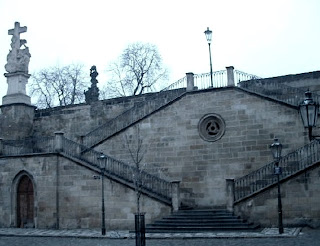In another part of the city, on the fourth floor of an elegant Old Town building overlooking the Vltava, representatives of the State would be sitting outside the door of the playwright and former prisoner Vaclav Havel, where they would examine papers, passports, and register any visitors having the temerity to be sociable.
At that time there was no need to explain what people with doctorates were doing laboring on building sites, why university professors were cleaning windows or stoking boilers. Or why former officials were sweeping floors. Havel had at some time earned a living rolling barrels in a brewery. Daniel, normally a journalist, cleaned windows.
Havel would become the country's President.
Daniel would become it's Ambassador to Israel.
'Are you being watched here?' I asked.
'Well,' said Daniel, looking towards the curtained window,' there are always Tatras around, but who knows really?'
The Tatra 613, vehicle of choice for all secret police.
'Actually I heard that the the pigeon-fanciers club is under surveillance, and you know what a threat to the system they are. No joking, this is true.' A wide grin spread across his black-bearded face. 'All that shit everywhere, how is totalitarianism supposed to function efficiently!'
While we were still eating, there was a knock at the door. Daniel placed his eye against the spyhole, and then said quietly... 'Jan.' Turning to me he said 'Listen, be careful what you say in front of this guy, ok?'
Jan, a neighbor, had called by, it appeared, to return a record. He was a young man in his twenties, ebullient, delighted to meet a new face, especially one from the west. Did I like jazz? Who were my favorite musicians? Had I seen them live? Did I know this or that recording? Would I like to see his collection of records?
Daniel shrugged. 'Actually, he wants you to see his fishpond.'
'Fishpond?'
'He's got a fishpond in his living room,' said Daniel wearily.
And so he had. Jan's apartment was two doors away. He led me into his living room and sure enough, framed by four heavy beams of wood with a sheet of plastic in support, with pebbles and sand forming a floor and a small waterfall cascading down across some rocks, there in the middle of his room was a fishpond. Four or five goldfish moved contentedly about.
I stayed as short a time as possible in Jan's company, before the discussion moved away from Chick Corea's collaboration with Gary Burton and onto my collaboration with his neighbor Daniel the dissident.
* * * * * * * *
Daniel stared at me in disbelief. 'You'll never get anywhere near him! The road will be full of fucking Tatras!'
'All I want to do' I said, 'is drop this into his letter box. If it's big enough.' I stood holding out the half bottle of Irish single malt whisky. 'If there's nobody watching of course.'
But of course there was someone watching. I had taken a taxi from the city center, for the airport, and asked the driver to go via the short road on the outskirts of Prague, where Seifert lived, to drop me at one end and wait for me at the other while I walked along past Seifert's large house. In front of it was a high mesh fence but with no sign of a post box set into it or behind, nothing which even resembled a post box. Where, I wondered, did he receive mail? But I didn't stop, I just kept walking as if I had no interest in the property because parked across the road was no black Tatra 613 with a couple of bored SB security men coating the interior with another layer of nicotine, but a police car.
'Do you like Irish whisky?' I asked the taxi driver as we approached the airport.
'I don't care which country it's from!' he said laughing. As I slipped out of the taxi I left the bottle on the back seat without saying anything and he drove off, stopping suddenly a few yards on, his door flying open.
'Hey man! Hey thanks, man!' he called, holding up the bottle - the famous Czech poet Jaroslav Seifert, Nobel Laureate's bottle.
When a man like me travels far from home he wants to go back with something in his pocket.
Franz Kafka - The Castle
I had my cobblestone.


